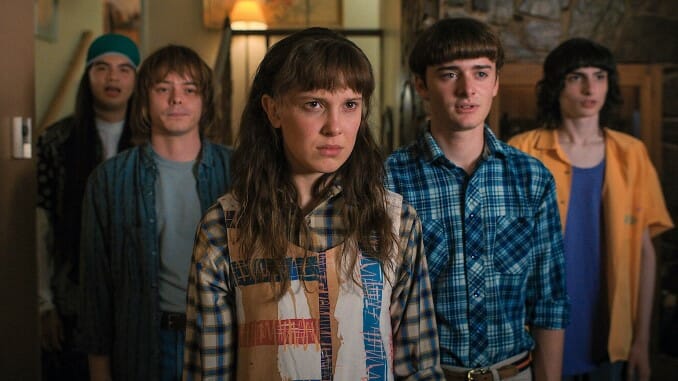No One Asked for Extra Long Episodes of TV, and We Shouldn’t Keep Letting Them Happen
Photo Courtesy of Netflix
It’s no secret that there is a massive amount of television at the fingertips of the everyday person. Now there are enough streaming services that some of them can fail without consumers feeling like they have lost anything. But instead of shorter runtimes to court viewers into investing in new series, the consequences of so much TV being available—old and new—has sent us to the opposite end of the spectrum. The episode counts are short, but the episodes themselves are unbearably long.
Before Netflix and its contemporaries wedged open the door to making episodes as long as a showrunner wants, there was a clear standard for how long viewers were expected to sit and watch something. While comedies have generally kept with the half hour structure, dramas have galavanted around with episodes longer than a reasonably sized movie. It’s not like long stretches of story were unheard of until now. The two-parter is a staple of network television, whether the episodes aired back to back or not, and Game of Thrones regularly had episodes that pushed past the 1 hour mark The final two seasons of the series are a good indication of when TV started to go too far. Instead of one extra-long episode per season, over half of the episodes in Seasons 6 and 7 were longer than an hour; and while there was certainly no saving the series from its terrible end, the bloated length of the final episodes certainly didn’t help.
In the last year, long episodes of TV have become more and more common in a way that is simply exhausting. Every episode of Inventing Anna is an hour or longer, and it killed the momentum that the series started out with in its first episode. It’s not like anything happens in these marathons of content either. A lot of times the things that make the episodes so long are either scenes that drag on to the point that you can leave the room and not miss anything, or that are rich enough to deserve to have an episode to themselves. The final three episodes of Inventing Anna felt like three separate series finales, not because there was so much going on in all of them, but because there was almost too much for the show to wrap up at one time. Had the show cut out the weaker portions of the story and slashed the episode count, watching it wouldn’t have felt like slogging through quicksand. On the other hand, had the show extended its episode count to 12 or 13 (running around 45 minutes each) instead of the 9 long ones we got, the weaker parts of the story would have had more time to develop, and maybe watching it wouldn’t have felt like such a burden.
It’s not like a show can’t be successful if it makes you sit for 90 minutes before it takes a break. Stranger Things 4’s shortest episode is 1 hour and 4 minutes long, and it’s the streamer’s most watched season of TV of all time. There are clear differences of course; Inventing Anna was a limited series based on a true story, and Stranger Things is a beloved franchise that is one of the keystone products of Netflix’s Original programming. People who love it were going to watch it regardless of episode length, and for the most part the show was able to stay cohesive. The question then became whether or not the show should have released in a weekly format instead of a bingeable one.
-

-

-

-

-

-

-

-

-

-

-

-

-

-

-

-

-

-

-

-

-

-

-

-

-

-

-

-

-

-

-

-

-

-

-

-

-

-

-

-








































